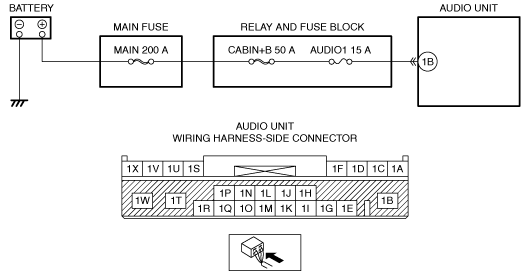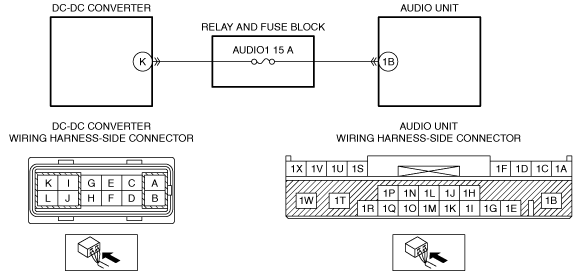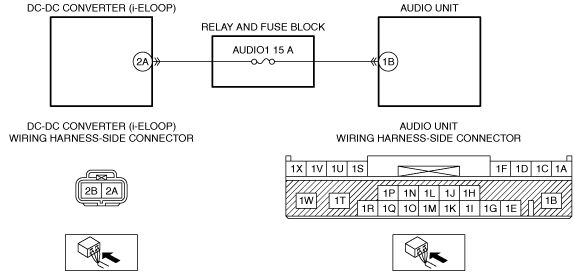|
1
|
VERIFY PCM DTCs
• Perform the DTC inspection for the PCM using the M-MDS.
• Are any DTCs displayed?
|
Yes
|
Repair the malfunctioning location according to the applicable DTC troubleshooting.
|
|
No
|
Go to the next step.
|
|
2
|
INSPECT BATTERY
• Is the battery normal?
|
Yes
|
Go to the next step.
|
|
No
|
Recharge or replace the battery, then go to Step 8.
|
|
3
|
INSPECT GENERATOR
• Is the generator normal?
|
Yes
|
Go to the next step.
|
|
No
|
Replace the generator, then go to Step 8.
|
|
4
|
INSPECT AUDIO UNIT CONNECTOR CONDITION
• Switch the ignition off.
• Disconnect the negative battery cable.
• Disconnect the audio unit connector.
• Inspect the connector engagement and connection condition and inspect the terminals for damage, deformation, corrosion, or disconnection.
• Is the connector normal?
|
Yes
|
Go to the next step.
|
|
No
|
Repair or replace the connector, then go to Step 8.
|
|
5
|
VERIFY AUDIO UNIT POWER SUPPLY VOLTAGE
• Verify that the audio unit connector is disconnected.
• Reconnect the negative battery cable.
• Switch the ignition ON (engine off or on).
• Measure the voltage at audio unit terminal 1B (wiring harness-side).
• Is the voltage 10 V or more?
|
Yes
|
Go to the next step.
|
|
No
|
Inspect the AUDIO1 15 A fuse.
• If the fuse is blown:
-
― Refer to the wiring diagram and verify if there is a common connector between AUDIO1 15 A fuse and audio unit terminal 1B.
If there is a common connector:
-
• Inspect the common connector and terminals for corrosion, damage, or disconnection and the common wiring harnesses for short to ground to determine the malfunctioning location.
• Repair or replace the malfunctioning location.
If there is no common connector:
-
• Repair or replace the wiring harness which is shorted to ground.
• Replace the fuse.
• If the fuse is damaged:
-
― Replace the fuse.
• If the fuse is normal:
-
― Refer to the wiring diagram and verify if there is a common connector between DC-DC converter (i-ELOOP) terminal 2A and the audio unit terminal 1B.
If there is a common connector:
-
• Inspect the common connector and terminals for corrosion, damage, or disconnection and the common wiring harnesses for an open circuit to determine the malfunctioning location.
• Repair or replace the malfunctioning location.
If there is no common connector:
-
• Repair or replace the wiring harness which has an open circuit.
Go to Step 8.
|
|
6
|
INSPECT DC-DC CONVERTER (i-ELOOP) CONNECTOR CONDITION
• Switch the ignition off.
• Disconnect the negative battery cable.
• Disconnect the service plug.
• Disconnect the DC-DC converter (i-ELOOP) connector.
• Inspect the connector engagement and connection condition and inspect the terminals for damage, deformation, corrosion, or disconnection.
• Is the connector normal?
|
Yes
|
Go to the next step.
|
|
No
|
Repair or replace the connector, then go to Step 8.
|
|
7
|
INSPECT DC-DC CONVERTER (i-ELOOP)
• Inspect DC-DC converter (i-ELOOP).
• Is the generator normal?
|
Yes
|
Go to the next step.
|
|
No
|
Replace the DC-DC converter (i-ELOOP), then go to the next step.
|
|
8
|
VERIFY THAT REPAIRS HAVE BEEN COMPLETED
• Always reconnect all disconnected connectors.
• Reconnect the service plug.
• Reconnect the negative battery cable.
• Clear the DTC for the audio unit.
• Switch the ignition ON (engine off or on) and wait for 10 s or more.
• Perform the DTC inspection for the audio unit.
• Is the same DTC displayed?
|
Yes
|
Repeat the inspection from Step 1.
• If the malfunction recurs, replace the audio unit.
Go to the next step.
|
|
No
|
Go to the next step.
|
|
9
|
VERIFY IF OTHER DTCs DISPLAYED
• Are any other DTCs displayed?
|
Yes
|
Repair the malfunctioning location according to the applicable DTC troubleshooting.
|
|
No
|
DTC troubleshooting completed.
|


